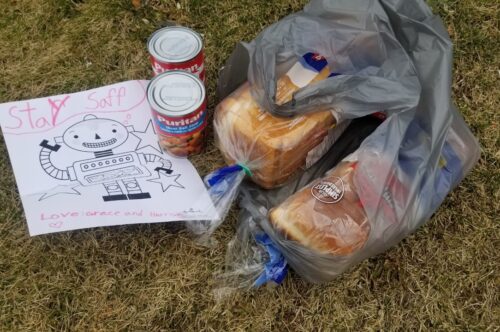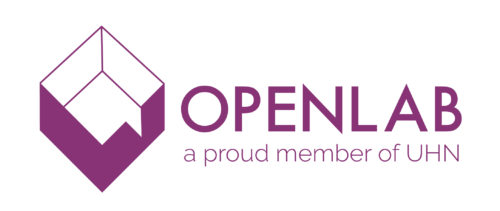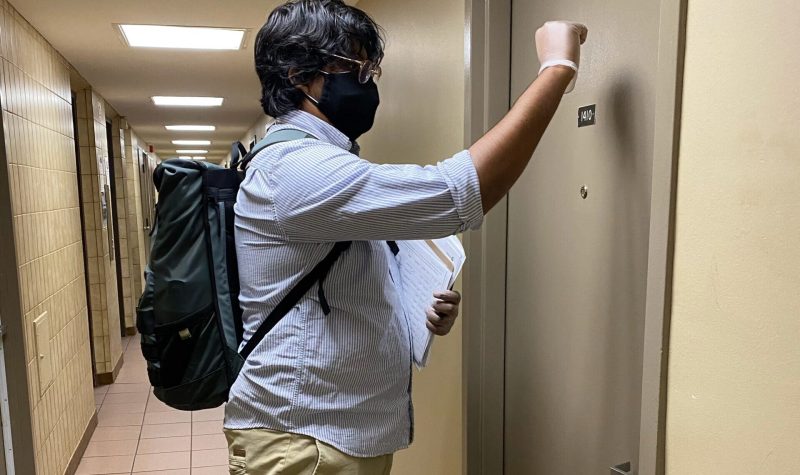
Typical delivery includes groceries, medication or household cleaners. Photo courtesy of OpenLab.
Since March 2020, the Friendly Neighbour Hotline has been helping low-income seniors age in their homes amidst the ongoing pandemic.
To keep seniors safe from COVID-19, their team of 700 volunteers complete small grocery runs across Toronto and deliver items right to their door. Typical orders include groceries, medication and household cleaners. Seniors simply call the toll free number (1-855-581-9580) and place an order in one of 180 languages. To learn more about the hotline, CJRU spoke with research analyst and program manager Craig Madho.
“It’s a network of volunteers spanning the entire city of Toronto, including Etobicoke and Scarborough. Who’ve said, ‘we’re willing to shop and deliver groceries to seniors in our local neighbourhoods’ … Over the course of the year we’ve managed to do just under 25,000 deliveries. Which is 12,000 individual seniors,” Madho said.
The hotline is connecting the community in more ways than one. Not only can callers get information on additional resources, the hotline’s volunteer network are being connected to even more opportunities. In addition to their usual deliveries, volunteers have supported a MLSE food delivery program, PPE packaging and delivery to seniors and hot meal delivery over the holidays. Now that vaccines are becoming available to seniors, volunteers are contributing to vaccine outreach too. Hotline operators are spreading awareness through conversation and volunteers in the community are helping seniors navigate the sign up process.
The Friendly Neighbour Hotline is run by OpenLab, a design and innovation shop based at the University Health Network (UHN). Their focus is finding creative solutions that transform the way health care is delivered and experienced. OpenLab is usually working on 15-20 projects at any given time, across the three labs. The Friendly Neighbour Hotline is part of the NORC lab.
Naturally occurring retirement communities (NORCs) are defined as apartment, co-op, and condo buildings that were not originally built for seniors, but have become home to a high density of older adults. Through their NORC lab, OpenLab offers services that can improve the lives of residents living in NORCs.

Graphic courtesy of OpenLab
In order for seniors to age in place, Madho says it isn’t complicated. Oftentimes, it comes down to whether they can accomplish activities of daily living. This can include getting groceries, making doctor’s appointments, filling out forms and perhaps navigating technology. He explains that for past generations, a lot of these tasks would be shared among family members, particularly adult children. But even before the pandemic, this workload was becoming difficult for the current generation of loved ones to bear.
“The reality is that adult children are having kids later in life, working longer hours. They’re moving further away as a result of the housing market. And through no fault of their own, they’re no longer available in the same capacity as they were before. And without those informal supports, what are seniors to do to actually remain in their homes?” Madho says.
Ultimately, the Friendly Neighbour Hotline is able to fill some of those gaps so seniors have a better chance of remaining in their homes. Alongside the hotline, OpenLab runs a number of projects that have similar or complimentary goals. For instance, OpenLab runs Oasis T.O., NORC Ambassadors and most recently, NORC vaccinations.
Currently, the Friendly Neighbour Hotline is available to low-income Torontonians over the age of 55. Recipients of Ontario Disability Support Program (ODSP), pension or similar programs typically qualify. Madho says that the easiest way to find out about eligibility is by calling the hotline. For community members looking to support the hotline, Madho says they’re currently recruiting volunteers and accepting donations.
To learn more about the Friendly Neighbour Hotline, listen to the interview with Craig Madho below:


